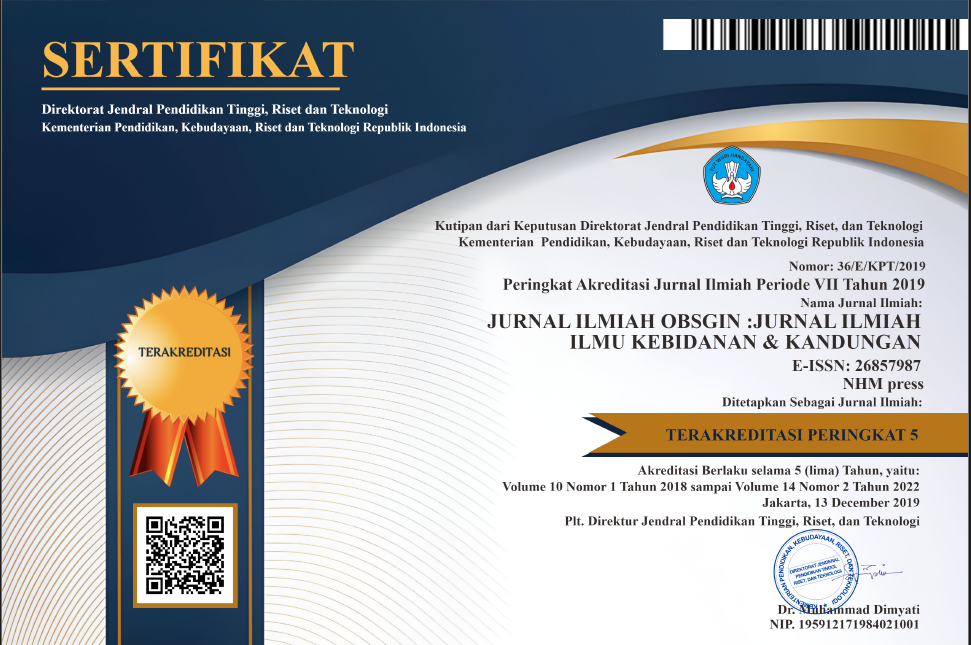Analysis of Holistic Midwifery Care For Maternal Health
Abstract
Maternal health is one of the global health development indicators which is always a challenge for all countries in the world strive to improve health and reduce mortality. Health is a state of complete physical, mental, social and spiritual well-being, so that holistic care is needed to fulfill these circumstances. The purpose of this research is analyzing holistic midwifery care for maternal health. The research design used a cross-sectional quantitative study that is analyzing the relationship between physical, social, mental, and spiritual health status to the holistic health status of the mother. Sampling was carried out by purposive sampling of 51 pregnant women. The analysis used Pearson's correlation test. The research results show 54.25% of pregnant women are in a state of less than average physical health status; 52.94% have less than average social health status; 45.1% have a mental health status of symptoms of anxiety; 41.18% have less than average spiritual health status. The statistical test results show that there is a relationship between physical, social, mental and spiritual health status on the mother's health status holistically. Holistic midwifery care can be carried out starting from assessment to management of early detection and referral and evaluation to optimize health conditions, especially maternal health.
References
Peraturan Menteri Kesehatan RI No. 21 Tahun 2021tentang Pelayanan Kesehatan Masa sebelum Hamil, Masa Hamil, Persalinan, dan Masa Sesudah Melahirkan, Penyelenggaraan Pelayanan Kontrasepsi, serta Pelayanan Kesehatan Seksual
Schultz, C., Walker, R., Bessarab, D. C., MacLeod, J., Marriott, R., & McMillan, F. (2014). Interdisciplinary care to enhance mental health and social and emotional wellbeing. Australian Government Department of the Prime Minister and Cabinet/Telethon Institute for Child Health Research/Kulunga Research Network in collaboration with the University of Western Australia.
Kementerian Kesehatan Republik Indonesia. (2022). Sosialisasi Buku KIA Edisi Revisi Tahun 2022. Direktorat Gizi KIA Kementrian Kesehatan RI. Retrieved from https://gizi.kemkes.go.id/katalog/buku-kia.pdf.
Taneja, S., Chowdhury, R., Dhabhai, N., Mazumder, S., Upadhyay, R. P., Sharma, S., & Bhandari, N. (2020). Impact of an integrated nutrition, health, water sanitation and hygiene, psychosocial care and support intervention package delivered during the pre-and peri-conception period and/or during pregnancy and early childhood on linear growth of infants in the first two years of life, birth outcomes and nutritional status of mothers: study protocol of a factorial, individually randomized controlled trial in India. Trials, 21(1), 1-18.
Faria, A. P. V., da Silva, T. P. R., Duarte, C. K., Mendes, L. L., Santos, F. B. O., & Matozinhos, F. P. (2021). Tetanus vaccination in pregnant women: a systematic review and meta-analysis of the global literature. Public Health, 196, 43-51.
Lutfi, M. F. (2011). Effects of hemoglobin concentration on heart rate variability. Age (years), 25(5.4), 24-9.
Daulay, N. (2015). Pengantar Psikologi dan Pandangan Al-Qur'an Tentang Psikologi. Kencana.
Mahmoodi. (2013). Hubungan Pendapatan dengan Keadian Penyakit Kronis.
Ingersoll R Elliot. Refining Dimensions of Spiritual Wellness : A Cross-Traditional Approach. Research and Theory.
Koenig, H. G. (2015). Religion, spirituality, and health: a review and update. Advances in mind-body medicine, 29(3), 19-26











